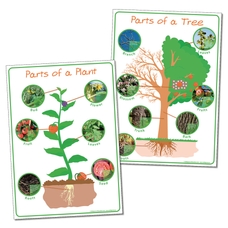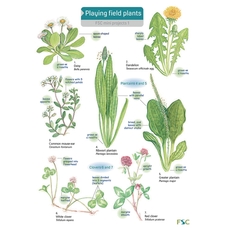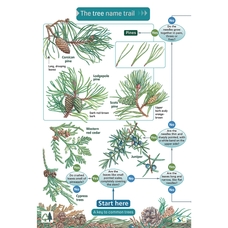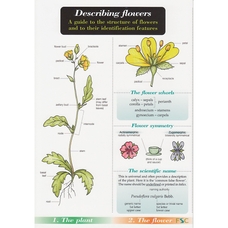Field Studies Council Guide to Woodland Plants
Field Studies Council Guide to Woodland Plants
Product code: HE1008023
Product Description
This guide provides users through a simple key to help them to identify the plants and animals that they find. Text on the reverse side of the charts provides further information. Splash proof and wipe clean for outdoor use. They are small enough to take into the field as the charts fold to B5 size (approximate size: 240 x 180mm).
The Field Study Council Woodland plants guide features 41 flowering plants of woods and forests.
Beautiful colour illustrations show the key identification features of each plant, including flowers, leaves and stems. The authors have grouped the paintings by flower colour: yellow, red, white and blue. Use this concise fold-out guide to quickly put a name to the flowers that you see.
But what if you find a plant that is not in flower? Based on the authors' many years of teaching botanical students, traditional wild flower guides are not much help here. So we've included a vegetative key to plants of woodland. This is a full identification key based on leaf characteristics.
A springtime visit to a woodland is a fantastic botanical experience. From bluebell to wood sage, and dog's mercury to yellow archangel, many plants flower before the leaf canopy closes. But there are plenty of woodland plants to see in the summer as well, particularly in rides and clearings.
This guide provides users through a simple key to help them to identify the plants and animals that they find. Text on the reverse side of the charts provides further information. Splash proof and wipe clean for outdoor use. They are small enough to take into the field as the charts fold to B5 size (approximate size: 240 x 180mm).
The Field Study Council Woodland plants guide features 41 flowering plants of woods and forests.
Beautiful colour illustrations show the key identification features of each plant, including flowers, leaves and stems. The authors have grouped the paintings by flower colour: yellow, red, white and blue. Use this concise fold-out guide to quickly put a name to the flowers that you see.
But what if you find a plant that is not in flower? Based on the authors' many years of teaching botanical students, traditional wild flower guides are not much help here. So we've included a vegetative key to plants of woodland. This is a full identification key based on leaf characteristics.
A springtime visit to a woodland is a fantastic botanical experience. From bluebell to wood sage, and dog's mercury to yellow archangel, many plants flower before the leaf canopy closes. But there are plenty of woodland plants to see in the summer as well, particularly in rides and clearings.





